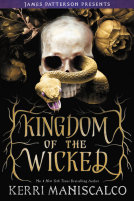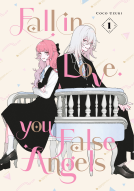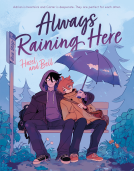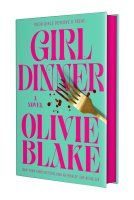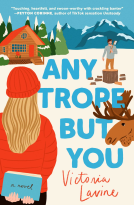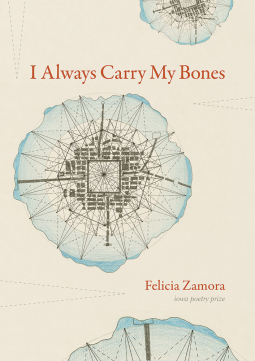
I Always Carry My Bones
by Felicia Zamora
This title was previously available on NetGalley and is now archived.
Send NetGalley books directly to your Kindle or Kindle app
1
To read on a Kindle or Kindle app, please add kindle@netgalley.com as an approved email address to receive files in your Amazon account. Click here for step-by-step instructions.
2
Also find your Kindle email address within your Amazon account, and enter it here.
Pub Date Apr 15 2021 | Archive Date Apr 15 2021
University of Iowa Press | University Of Iowa Press
Talking about this book? Use #IAlwaysCarryMyBones #NetGalley. More hashtag tips!
Description
Advance Praise
“It’s said that the body remembers, and this book reveals that memories, too, embody. The story of a lived, living body is stored, stored-up until it spills over onto pages full of memories, rage, power, cruelty, survival, love . . . and some stubborn belief that a body will find a way to tell the truth. The poems ask: What did it take to survive? The poems answer: It took every cell moment by moment, accounted for, told on, inscribed, memorized.”—Brenda Shaughnessy, judge, Iowa Poetry Prize
“‘What dwells in land, dwells in you,’” writes Felicia Zamora in I Always Carry My Bones, a book that flows as streams do: relentlessly despite obstructions, despite injustices. Through a boundless range of analysis, Zamora renders trauma in the brown body as a ‘lone thistle in the torrent of letters.’ Her poems are ecstatic and leap in pursuit of truth and cruel beauties. Zamora’s work will remind you that the world is the body— science and psyche. This book is thread let loose and there’s no telling which direction Zamora will pull it.”—Diana Marie Delgado, author, Tracing the Horse
In Zamora’s lines, one connects images to narrative threads, peaks to trails, glimpsed like a face lit up ‘amid the mulberries at twilight.’ I Always Carry My Bones carries itself, past salvage or triage, the unevenness of light, to imagining—‘we imagine / ourselves every moment’—where the body might carry itself, imagined anew. —Jos Charles, author, Feeld
Available Editions
| EDITION | Other Format |
| ISBN | 9781609387761 |
| PRICE | $20.00 (USD) |
| PAGES | 90 |
Links
Featured Reviews
Whetted. Powerful. Searing. Indelible. Though not what I would consider easily digestible poetry, this collection foments. It awakens. It shoots a disembodied chorus of awareness across synapses as if it were lightning.
Employing both brutal metaphor and description, it knocked my head open with the blunt force of its themes, my eyes watering at every fractured punch of imagery that was bound up in eclogues of racial ideation or reality. I was unable to read this without feeling the thumb indentations of oppression, of abuse, against my windpipe.
This is poetry with a penetrative POW of meaning! Read it for yourself and see if it doesn't haunt, doesn't stoke. Be prepared for it to root deep, embedded, through your bones.
Thank you to NetGalley and University of Iowa Press for the ARC.
This collection spins around the axis of the body as metaphor and boundary. This takes place through four connected systems: the person, the person plus one, the political, and the natural world.
"Let's say your body's a caterpillar, an accordion in scooch / among branches"
Each of these poems reminds the reader that we are all separate, but connected. We share and inhabit the same, but separate, spaces. We breathe the breath of one another and move through the world shaped by our neighbor's bones and muscles. But, our body is our own and only sacrosanct space.
"After shuck & caw, light / slats between each vertebra, bone illuminate
The shape of these poems varies. Some slam-like in reading, others more prose, and an occasional straight up story. There's a unique anatomy to the line breaks and the language. Occasionally this evokes the feeling of being small and vulnerable while a larger body envelopes you, blocking out full comprehension, the way a parent might shield you from tragedy.
"You turn / your chest from me & behind ribs I become / more hummingbird than human"
These poems felt like a grappling from a place of grounding within the only thing we truly know, within ourselves. Our bodies which hold so much memory. If these bones could talk, I suppose. And often, what's outside of our bodies is outside of our control, and this creates a tension. A vulnerability. A poem.
"If you draw a line in the sand, the surf swallows / what you have done; disobedient tide song"
And that tension is where we find ourselves and our agency.
"We call these passages, pupils."
"We call these passages, witness."
Thank you to NetGalley and University of Iowa Press for a copy of this book in exchange for an honest review.
WOW. I am just so floored by this poetry book. This is a phenomenal poetry book. Like everyone needs to read this.
I highlighted SO many lines and sections and entire POEMS from this book because I kept feeling my eyes widen and just kept feeling punched in the gut over and over.
Language and words. Just wow.
A smart, often brutal, collection of poems that I will absolutely reread and recommend to so many people.
What a breathtaking collection of poems! These poems will remain a searing reflection of the years of the Tr*mp administration especially through the perspective of a person of color. What stood out most to me are the lines about the concentration camps (yes, I said what I said). Beautifully and painfully, Zamora's words bring recognition to the atrocity of parents being separated from their children at our borders. This is a must-read--- even if you aren't necessarily a poetry person.
Felicia Zamora’s ‘I Always Carry My Bones’, winner of the 2020 Iowa Poetry Prize, is composed of three parts: ‘In Breach of Etiquette’, ‘Weight of Indentation’, and ‘Where the Carriage of My Cells Catch’.
Zamora lived as a child with her white grandparents in Iowa. “It was a place where other people told me I was disgusting before I could discover myself.” It was here her grandfather said, “You’ll never amount to anything, you worthless little spic” as in her powerful poem, ‘Motel’, she thinks ‘ I had done/ something wrong to never/ warrant celebration”.
She uses her body, tissues, bloodstream, organs and cerebrum as a pivot through which she explores an estranged relationship to Mexican culture, the ethereal ache of an unknown father, the indentations of abuse, and a mind/physicality affected by doubt, these visceral, breathtaking poems rooted in the search for belonging.
As a Latinx woman historically invisible and derided within the United States, these astonishing poems speak to a long history of political injustice, systemic racism and oppression towards people of colour and migrant people.
In poems she makes reference to the caging of immigrant children at the Texas-Mexico border as well as the drowning deaths of two Salvadoran border crossers found washed ashore on the banks of the Rio Grande River.
Her poetry calls for collective action, immigrant’s rights, social justice and makes a claim for the sanctity of all humans.
In a letter to Oskar Pollack on 27 January 1904, Franz Kafka wrote: “A book must be the axe which smashes the frozen sea within us”. After sitting with the poems in ‘I Always Carry My Bones’ I feel hypothermic and submerged up to my neck in water.
Felicia Zamora is a poet, educator, and editor currently living in Ohio. She is the author of six books of poetry and an assistant professor of poetry at the University of Cincinnati and the associate poetry editor for Colorado Review.
A huge thank you to @NetGalley for an ARC in exchange for an honest review.
Readers who liked this book also liked:
By Kotteri, translated by Jocelyne Allen
Comics, Graphic Novels, Manga, General Fiction (Adult), Teens & YA
Kotteri, translated by Jocelyne Allen
Comics, Graphic Novels, Manga, General Fiction (Adult), Romance
Mamenosuke Fujimaru
Comics, Graphic Novels, Manga, Romance, Sci Fi & Fantasy
